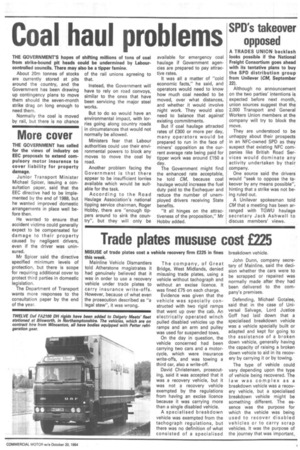Coal haul problems
Page 7

If you've noticed an error in this article please click here to report it so we can fix it.
THE GOVERNMENT'S hopes of shifting millions of tons of coal from strike-bound pit heads could be undermined by Labourcontrolled councils. There may also be a tipper famine.
About 20m tonnes of stocks are currently stored at pits around the country, and the Government has been drawing up contingency plans to move them should the seven-month strike drag on long enough to need them.
Normally the coal is moved by rail, but there is no chance of the rail unions agreeing to that.
Instead, the Government will have to rely on road convoys, similar to the ones that have been servicing the major steel works.
But to do so would have an environmental impact, with lorries going along country roads in circumstances that would not normally be allowed.
Ministers fear that Labour authorities could use their environmental powers to block any moves to move the coal by road.
Another problem facing the Government is that there appear to be insufficient lorries available which would be suitable for the task.
According to the Road Haulage Association's national tipping service chairman, Roger Hobby, there are "enough tippers around to sink the country", but they will only be available for emergency coal haulage if Government agencies are prepared to pay attracti,ve rates.
It was all a matter of "cold economic facts," he said, and operators would need to know how much coal needed to be moved, over what distances, and whether it would involve night work. They would also need to balance that against' existing commitments.
But if coal haulage attracted rates of £300 or more per day, many operators would be prepared to run in the face of miners' opposition as the current average rate being paid for tipper work was around £150 a day.
The Government might find the enhanced rate acceptable, he told CM, because coal haulage would increase the fuel duty paid to the Exchequer and reduce the number of unemployed drivers receiving State benefits.
"It all hinges on the attractiveness of the proposition," Mr Hobby added.
































































































































































































































